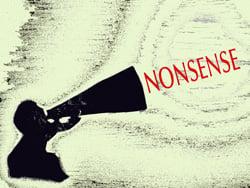The media performs the
functions of both the mouth, and eyes-and-ears of its audiences. Here was a
chance for the mouth to shut up for once and for the eyes and ears to take in
the reality; to look at the image of news media as portrayed by the consumers
of media; to contemplate and deconstruct the recent developments, beginning
with the ‘whispering campaign’ about a grand plot against the judiciary and
culminating in exposing media as a party in the plot; and collectively suggest,
agree on, and implement corrective measures aimed at restoring media’s
credibility.
Instead, the newspapers
started throwing the blame on TV, particularly its talk-show hosts, and the
television brayed in its defense like never before. Mehr Bukhari attempted the
impossible by telling her audiences what they saw in the leaked clips was
something that happens in talk-shows on a daily basis and was no big deal
really; the real crime was stealing of private moments in the studio, and that
is what should be condemned. Her co-host Mubashir Luqman was however suspended,
apparently for throwing an on-air tantrum during what he believed was a
commercial break.
Talat Hussain deciphered
the jargon for his audience and explained, frame by frame, how Dunya hosts had
trampled every principle and ethic in the book of journalism. He was of the
view though, that the unprofessional conduct of a ‘handful’ of media
personalities should not eclipse the honesty and professionalism of a vast
majority of media practitioners. Hamid Mir did several programmes in which he
demanded accountability of all senior journalists, while Nusrat Javed thundered
his prediction that the government was going to use this incident to tighten
the noose around news media’s neck and the assorted leaders of journalists’
bodies responded by rolling up their sleeves and vowing to fight back.
Here then is a media just
as confused about itself as it is about everything else it takes up. The
malaise is much deeper and widespread than the media’s ability or inclination
to see and report it. The operating word is not ‘professional malpractice’ but
plain old corruption. From a small town correspondent cum news agent, to the
sub-editor, editor and owner, corruption is rampant in both print and
electronic media, and in that respect Ms. Bukhari is more right than Mr.
Hussain, though it makes for a lousy excuse for her own and others’ conduct.
And who is going to hold
media to accountability when its own professional bodies have failed in their
role as watchdog and have consistently opposed reforms from outside? But
accountability was what everyone seemed to want for all of the six days before
the prime minister was disqualified by the Supreme Court, and the news bulletins
and talk-shows abruptly moved on to the next burning subject.
The leaks failed to bring
a positive change, just like the Maya Khan episode, Punjab Assembly’s bill
criticising a section of media, and coverage of Karachi carnage of May 2007, and
Mumbai attacks failed before it, though all these incidents triggered just as
heated a debate on media ethics as seen in the recent days.
Dunyaleaks was an
incident comparable to the filming of FC soldiers wantonly killing a young man
in a Karachi
All that Dunyaleaks achieved
was bringing journalists closer to politicians. The latter have been ridiculed
and riled up for their failures and corrupt practices for as long as the
private TV channels have existed. It was now time for the politicians to smile
and welcome media personalities into the club of the disgraced, and to suggest,
tongue in cheek, why doesn’t TV run Indian songs to illustrate the journalists’
wrongdoings?
But the issue of media
ethics is already soooo last week. It’s going to be business as usual, until
the next revelation whenever it comes. And then we’ll start demanding media
accountability all over again.
